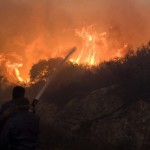 (Published in Spanish on July 9, 2013) In the unfortunate accident of the collapse of the building that housed several textile workshops in Bangladesh last April the final death toll reached 1129 dead. International protests arose immediately. There was outrage at the working conditions of the workers in the country. Last June the Obama administration suspended the trading privileges of Bangladesh, referring to its poor labor standards. Now it has been reported that unions and NGOs have signed a safety agreement with the large retailers and fashion brands for whom the majority of textile mills in Bangladesh manufacture.
(Published in Spanish on July 9, 2013) In the unfortunate accident of the collapse of the building that housed several textile workshops in Bangladesh last April the final death toll reached 1129 dead. International protests arose immediately. There was outrage at the working conditions of the workers in the country. Last June the Obama administration suspended the trading privileges of Bangladesh, referring to its poor labor standards. Now it has been reported that unions and NGOs have signed a safety agreement with the large retailers and fashion brands for whom the majority of textile mills in Bangladesh manufacture.
The agreement provides for a thorough inspection in the next nine months, in order to “identify major risks and need for urgent repairs.” Depending on the results the owners may be asked to cease operations. The agreement includes arbitration enforceable in a court of law but does not contain provisions for penalties. “This historic, legally binding agreement will lead to tangible changes and help make the Bangladeshi garment industry safe and sustainable”, said one of the signatories.
History repeats itself: first is the tragedy, then come the legal norms and some measures to prevent recurrence. It is a phenomenon that occurs not only with industrial accidents but also with financial frauds and scandals. We may recall the legislation and control measures regarding insider trading after notorious scandals on Wall Street in the 1980s. The U.S. law known as the Sarbanes-Oxley Act (2002), which regulated corporate accounting and auditing more strictly, was passed just one year after the scandal of Enron and other companies.
More recently, in our country, we have seen government regulation motivated by abuses committed by some savings banks’ executives relating to mortgages in practice the treatment of preferential shares. It would not surprise me to see regulatory changes following the controversial Bankia IPO. The question is: Isn’t it better to prevent than to be led by events? I know this is not always easy, but an ethical attitude is a better aid to seeing potential damage to people than is an economistic approach.
It is better to prevent fires than having to regret them. If the company is looking to be proactive, anticipating market developments or competitor initiatives, seeking creativity and innovation, why not come forward with an ethical reflection, and act before disaster strikes or the law demands? I suggest introducing the concept of preventive ethics, and, above all, applying it.
Esta entrada también está disponible en: Spanish

